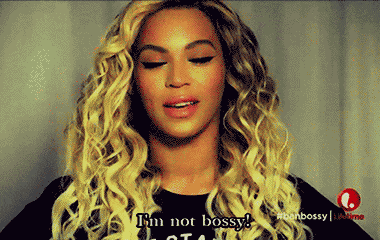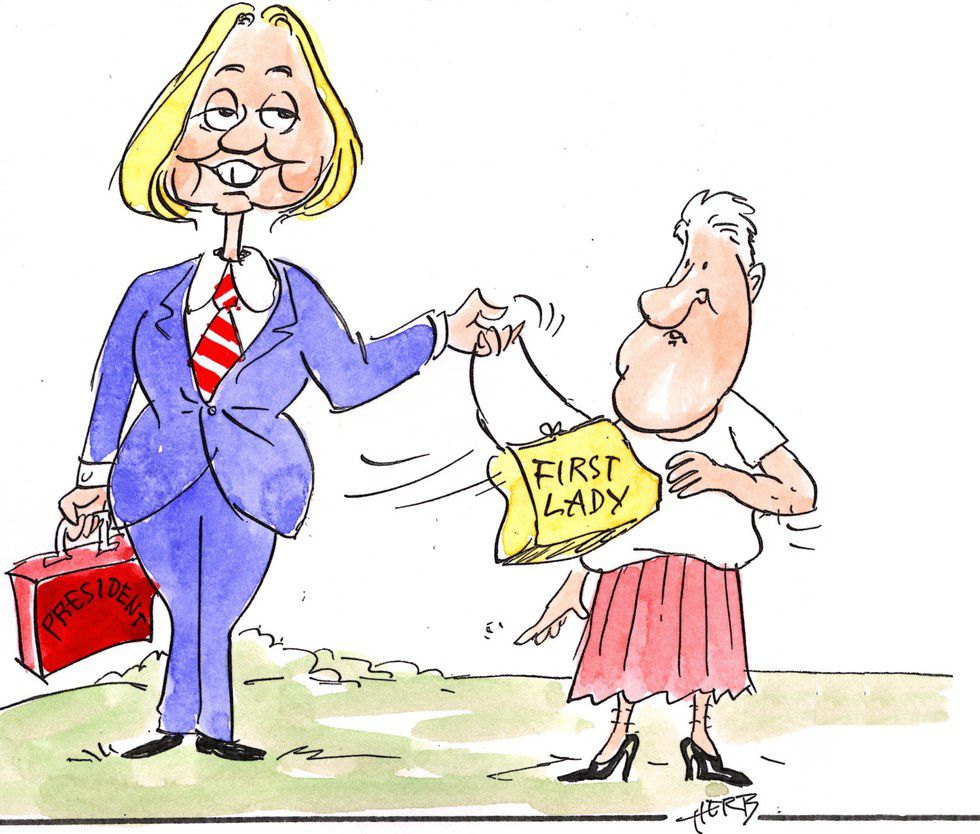Lots of people really hate Hillary Clinton; this, of course, is not a revelatory statement. However, as the Democratic nomination approaches,
I've been noticing a lot of articles, Facebook posts and drunken arguments that have revealed the following: many people think "Hillary-hate" exists solely because she's a woman.
Several of my female friends have taken to social media, declaring that it is a bold move to declare support for Hillary publicly because of a sexist disdain extant among many voters.
This prejudice that they speak of is of course blatant within circles of Trump supporters. However, it has also emerged again and again within the Democratic party and even among self proclaimed liberals. With those involved in groups such as Women for Bernie, for instance, Hillary supporters often use words like "traitor."
For the record, I will absolutely vote for Hillary if she's the Democratic nominee (#NotTrump2016). However, I will admit, this would not be my ideal situation. I regularly tell "I'm With Her" gals that I can't support a woman who isn't for all women.
That being said, my knee-jerk reaction to my friend's posts of Hillary love was a tad exasperated. I thought, roughly, "How dare you! I'm a liberal, politically involved feminist. Of course I don't hate Hillary because she's a woman. Don't you dare use feminism to defend a bad candidate." About one minute after my self-righteous outrage, I of course realized I was being ridiculous. A pillar of any critical theory, from feminism to critical race theory, is that we are all indoctrinated into an oppressive system. It is around us, above us, below us, and within us. I am sexist. We all are.
Still, in accepting that Hillary's womanhood undoubtedly affects her candidacy, we must separate Hillary problems from female problems. While no aspect of Hillary can be entirely disentangled from her femaleness, some issues that are far more gendered than others. Here's my best attempt at a breakdown:
Female Problems:
1. Periods
Let's kick it off with the most obviously sexist issue. Hillary is a woman and therefore is biologically predisposed to a certain level of irrationality and emotion. Some men (who clearly have no women in their lives) still cite her period as a reason not to make her commander in chief. To these people, I will say this: that ship has sailed, hombre.
Believing a woman, biological processes and all, is inherently less capable than a man is pretty much textbook sexism. Also, have you seen Hillary? If anything, she's too cold and calculating (but we'll get to that).
2. What About Bill?
The possibility of a First Gentleman really freaks people out. Who will select the china? Who will be hostess? One need only Google "Bill Clinton First Lady" to see the plethora of sexist concern over a man with a strong wife.
These concerns are the epitome of old-school sexism. A woman with a job? A man who isn't controlling his wife? The horror! What's really going on is this: the First Lady-ship is a uniquely American and highly antiquated position. It's perceived as fit for a woman but humiliating for a man.
3. Pantsuits
Honestly, aren't people tired of reporting on pantsuits, lipstick, and haircuts yet? Media coverage, particularly new media, often demonstrates a much more sexist tone than actual voters (as studied by many political scientists– check out Jalazai, Huddy and Terkildson, and Kahn if you're interested). So while voters may not actually care that much about Hillary's wardrobe, we're gonna keep hearing about it because of gendered media coverage.
Hillary Problems:
1. Financial and Foreign Policy
Hillary just isn't liberal enough for many Democrats. Her financial policy, not to mention her cozy relationship to big banks and corporations notorious for greed and wrecking the economy, is much more moderate-conservative than leftist. This is especially true when viewed in global perspective. Added to her decidedly status quo financial policy, Hillary is an avid supporter of military intervention in the Middle East. We're talking boots on the ground military intervention. This might play well with Republicans who aren't ready to vote for the molding Cheetos puff that is Trump, but for many liberals this is extremely concerning.
Some argue that Hillary has no choice but to be a hawk if she wants to win, that any woman with dove-like tendencies would be called weak and unable to make tough choices. And this may very well be true. Yet, it does not excuse the immorality of war.
I said before that I cannot vote for a woman who is not for all women. If Hillary Clinton wants the feminist vote (and not just the white feminist vote), she needs to respect the lives of all women. In the United States, this demographic includes poor women, working class women, and students who continue to struggle under a financial system rigged by big banks. However, it also encapsulates women living in Iraq, Afghanistan, Pakistan, Syria, and wherever else Hillary would escalate violence already incited by our drones.
2. Which Women? Which Hillary?
I know Hillary is very popular among some racial minorities and is purported to get the "gay vote." They feel she best represents her interests, and I, of course, cannot speak for them. However, Hillary has been engaged in some seriously sticky minority issues not only during this campaign, but also during her time as a Senator and as a First Lady. As a matter of fact, the hashtag #WhichHillary has often been used to draw attention to Hillary's history of supporting discriminatory policies.
She once, for instance, called at-risk, inner-city (read: black and brown) teenagers "super-predators." A Black Lives Matter activist brought attention to this during a fundraiser this year:
1996
2016
The issue, of course, gets messy because many of the policies in question, such as Don't Ask Don't Tell, DOMA, and the Violent Crime Control & Law Enforcement Act that brought about the federal Three Strike rule, were her husband's policies, not her own. Does a First Lady really have any choice but to support the President's actions? Probably not. But the vigor with which she defended the crime laws (and the racist language used) is concerning, as is the way she justifies Bill's laws.
In a 2015 interview with Rachel Maddow, Hillary painted these discriminatory policies as defensive actions taken to prevent more extreme measures.
“I think that sometimes as a leader in a democracy you are confronted with two bad choices and it is not an easy position and you have to try and think what is the least bad choice and how do I try and cabin this off from having worse consequences?”
Many of the issues in this upcoming presidency will be socially grounded: trans rights, immigration reform, women's health rights and financial reform are just a handful. All this being said, do we want a president who will cave in to the obscene, bigoted demands of the far right? In a time where Trump and his supporters have called for internment of Muslim Americans, splitting the difference seems like an even more reckless methodology than during the first Clinton presidency.
3. Trustworthiness
An approximate 37 percent of people believe Hillary Clinton is honest and trustworthy, according to a recent poll.
So why do people not trust Hillary? Trust often gets mushed into likability, which is actually more gendered issue related to a suspicion of women in power. This, however, will be determined later.
I, however, can think of various incidents beyond this sexist mindset that have likely contributed to Hillary's low trustworthy ratings:
Lied About Being Shot at in Bosnia: This is the fun weird one. Perhaps in an attempt to bulk up her foreign policy credentials in 2008 (pre-Secretary of State), Hillary Clinton told a story of visiting Bosnia as FLOTUS:
"I remember landing under sniper fire. There was supposed to be some kind of a greeting ceremony at the airport, but instead we just ran with our heads down to get into the vehicles to get to our base."
This is totally incorrect. CBS news debunked it back in 2008:
Hillary has walked it back in stages, first saying she was "sleep deprived" and therefore misremembered, and later retracting it as a whole. Regardless of the intent, her Bosnia drama was entirely made up.
Forgetting: Speaking of convenient memory lapses, Clinton recently forgot that Bernie Sanders was literally "with her" during Bill's presidency as she attempted healthcare reform. This, of course, isn't a huge gaffe on its own, but the plot thickens:
"I don't know where he was when I was trying to get health care in '93 and '94, standing up against the insurance companies, standing up against the drug companies."
Oops.
Terrible with the press: In Hillary's 2008 run, she repeatedly shut out and coldly rebuffed the press, even those who were supposed to be "friendly" to the campaign. This mode of action was detailed in Lawrence and Rose's book,"Hillary Clinton's Race for the White House: Gender Politics and the Media on the Campaign Trail."
This of course creates a vicious cycle: the press distrusts Hillary because she's not cooperating, the press reports this to the public, other reporters pick up the narrative of Hillary as untrustworthy, Hillary is less likely to cooperate with distrusting journalists, and back to the start.
Emails: Yes, this really does matter (although Republicans have undoubtedly co-opted the email scandal in an attempt to bludgeon Hillary Clinton to her political death).
In short, Hillary broke federal laws and could have endangered national security because she chose to use her own private email out of convenience. To quote The Federalist, "Any other government employee would be fired and prosecuted for doing what Hillary Clinton has done with her emails." If Hillary Clinton feels she can buck the rules for convenience, we should be concerned about her sense of entitlement. This ties nicely into the next Hillary problem.
4. Dynasty
While this joke was clearly written with Jeb Bush in mind, the distrust of political dynasties is relevant. At first glance, the common rhetoric around a third term of Clinton may appear simply sexist. Do we expect Bill to play a prominent role because we assume any husband would assert his authority over his wife? Are we punishing Hillary for being married to Bill (though I think Bill took care of that for us)? I suspect the answer is yes, and that Hillary is very aware of this, hence the few Bill sitings this campaign cycle.
The problem here is that the Clinton's very clearly marketed themselves as a package deal back in the 90s when Bill ran– two for the price of one! Hillary made a point of capitalizing on the role of First Lady by taking on healthcare reform rather than the usual soft (though important) issues of First Ladies. The Clinton's set up a scenario where voters can logically, and not necessarily in a sexist mindset, assume that Bill Clinton will be a large part of a Hillary presidency.
There is no doubt that our concept of American meritocracy fractures when names like Bush, Clinton, and Kennedy continually hold power.
Likability...the Really Messy Problem:
Hillary's likability issue is the most deeply entwined Hillary-is-a-woman problem. We all know assertive, successful, powerful women get called bossy b•tches and there's no reason Hillary would be an exception here.

I also suggested earlier that Hillary's hawkishness creates a jarring dissonance with our expectations of femininity. Women are supposed to be compassionate moms, and Hillary seems more likely to order a drone strike than to bake cookies. It is very possible that liberals oppose her foreign policy so forcefully because this crack in gender performance amplifies an already unappealing policy.
Speaking of compassion, we have to think about her opposition. When asked what he would want to be known for as a president in one word, Bernie Sanders answered "compassion." While this makes my liberal heart want to cry hippie tears of love and joy, I also have to pause and think about what would happen if Hillary answered the same. There is no lovably disheveled, cooky, compassionate, old person trope available to political women the way it is to men. That's not to say compassion isn't an option for women like Hillary, but rather that should she choose compassion she will likely lose political points rather than gain.
So in a sexist sense, we probably all have at least a slight knee-jerk reaction to view Hillary as a cold, compassionless b•tch with no hobbies. However, trust is also a huge part of likability, and I have already spent considerable wordage outlining how Hillary came to be seen as untrustworthy, discriminatory, entitled, and conservative. The old adage that Hillary Clinton is a litmus test for sexism in politics is far too simplified.
In conclusion...
Loving or hating Hillary is not enough to indicate a person's commitment to gender equality. Very few politicians have as long, public, complicated, and gendered of a career as that of Hillary Clinton. It thus takes a lot of work to make meaning out of Hillary hate and its various shades.
If Hillary wants to win, being a woman may limit her ability to pursue progressive policy. However, if the game is truly rigged against compassionate women, we all have a choice to make. Do we cave to the unfair, rigged game to meet our ambitions? Or do we stand by our morals and keep fighting, understanding that our generation may not see a woman in the White House if she runs on compassion?
I vote that we do this the right way. Don't try to game the system for who "has the best chance" of beating Trump, working with Republicans, or even becoming the first female president. Rather, support candidates that match our morals. Voting, after all, is a great privilege we should not waste.


























